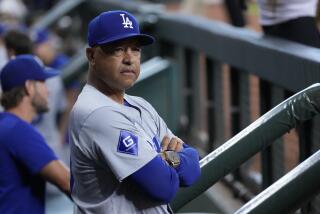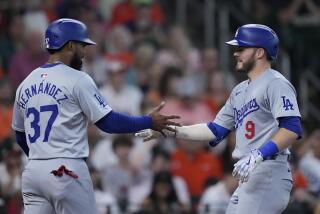Winter Baseball Meetings : Without Deadlines, There’s No Reason to Deal
- Share via
SAN DIEGO — The winter baseball meetings will open here today.
Shamu, the killer whale at Sea World, is expected to make a bigger splash.
Since the new collective bargaining agreement has eliminated virtually all the interleague trading deadlines, this year’s event is expected to be devoid of the widespread wheeling-and-dealing that once made the winter get-together a baseball swap meet.
The meetings used to end on a Friday with a midnight trading deadline. They used to end with a flurry of 11th-hour negotiations in a smoke-filled lobby.
It’s appropriate that the Town and Country Hotel, headquarters for the 1985 meetings, lacks a lobby.
Who needs the camouflage of a potted palm when there is no trading deadline? The meetings are now scheduled to end Thursday.
The only trading deadline is July 31, and that only to the extent that waivers are required to consummate a trade between Aug. 1 and the end of the season.
Said an American League official who requested anonymity: “I don’t think the meetings will be as meaningful now as they’ve been in the past.”
Said Pat Gillick, the Toronto Blue Jays general manager: “With no deadline crisis, decisions can be postponed.”
Angel General Manager Mike Port, searching for a left-handed relief pitcher and a young catcher who would eventually succeed Bob Boone, said there will be as much effort and energy expended on trade talks, “but the question is how many deals will be consummated.”
“We now have the luxury of being able to put things aside,” he said. “We don’t have to worry about acting prematurely.
“The trading deadline had to go. There’s too many complexities involved with today’s contracts. It was impossible to take care of all the details in a limited time.”
Dodger Vice President Al Campanis, looking for a left-handed relief pitcher and a right-handed hitting center fielder--Seattle’s Dave Henderson?--to platoon with Ken Landreaux, said it will be easier now.
“There’s no rush,” he said. “A lot of clubs may defer trading until they can see what their situation is in spring training.
“We now have the opportunity to see how the rookies develop in the spring and to check out the sore arms.”
Campanis has a way of stirring up blockbuster trade talks, but the development of shortstop Mariano Duncan and the acquisition of third baseman Bill Madlock have diminished the Dodgers’ needs.
“Last year at this time, we were in desperate need of a third baseman and probably would have given up some people for Buddy Bell if Texas hadn’t played hardball,” Campanis said.
“Now, we’re in much better shape. If we don’t make a deal, we haven’t been hurt.”
The playoff with St. Louis again seemed to expose the Dodgers’ need for a left-handed relief pitcher, but Campanis now believes the Dodgers can fill it from within.
He cited Dennis Powell as one possibility and talked excitedly about 22-year-old Felix Tejeda, who is 7-1 in the Mexican Winter League.
“I don’t care if we get another left-handed relief pitcher,” Campanis said. “It’s not our primary concern. I mean, we can wait until spring training. I want to see our relief pitching before rushing into a trade.”
Likewise, Campanis believes he has a future center fielder in 21-year-old Jose Gonzalez, who would be making the jump from Double-A San Antonio if he were to make the club. Campanis said he would prefer giving Gonzalez a year at Albuquerque.
“I’d say that our chances of dealing for a top center fielder are nil,” Campanis said. “I don’t know of any club that’s in position to give up one. Since Tommy (Lasorda) likes to platoon with Landreaux, we’re looking for a right-handed hitter as a supplement (until Gonzalez is ready).”
Candy Maldonado was platooned with Landreaux last year, but Gonzalez now obviously has replaced him in Campanis’ future book.
Campanis would not specify the clubs that might supply a right-handed-hitting center fielder, but Seattle is definitely one.
The teams have been talking about Seattle’s interest in catcher Steve Yeager and the Dodgers’ interest in left-handed relief pitcher Bill Wilkinson, who had a combined minor league record of 11-2 last year.
It’s conceivable that the talks could be expanded to include Maldonado and Seattle’s Henderson, who is on the block. Henderson, 27, hit .241 with 14 homers and 68 RBIs last year. He’s not Rickey Henderson, whom the Dodgers pursued a year ago, but it’s generally agreed that he has yet to reach his potential.
The Mariners are high on a young outfielder named Mickey Brantley, and would move left fielder Phil Bradley to center if Henderson goes in a deal not involving another center fielder.
The Angels, Port said, are not yet close to a trade.
“It seems like we’re all looking for the same things,” he said, alluding to a catcher and a left-handed relief pitcher.
“My attitude is that I’d rather leave here without having made a trade then to have made the wrong trade just for the sake of saying, ‘Look, we made one.’
“I want to continue our recent progress.”
The Angels are moving toward a major turnover, replacing many of their veterans with products of their once-demeaned farm system.
Port admitted that the Angels do not have a lot to offer in the way of a trade, though they may be in the rare position of boasting an extra starting pitcher or two.
Player representative Ron Romanick, whose union advocacy angered some club officials and who slumped miserably after the August strike, may be expendable. So may the promising Urbano Lugo.
Port, meanwhile, has been forced to spend much of the winter making decisions on the club’s 10 potential free agents.
Here’s how it stands:
--The Angels have severed ties with Rod Carew, Al Holland and Juan Beniquez, who at 35 is seeking a multiyear contract. Port, with his now promising farm system, wanted to take it a year at a time.
--Pitchers Geoff Zahn and Ken Forsch, who are both coming off arm surgery, have accepted the club’s invitation to attend spring training conditionally.
--Although the paper work has yet to be signed, Reggie Jackson has exercised his option and will return in ’86. Similarly, the club exercised its option and retained Ruppert Jones.
--Bobby Grich and Don Sutton have been re-signed for 1986. The club also has a 1987 option on Sutton.
That leaves relief pitcher Donnie Moore, whose representatives, David Pinter and Peter Rose, are here to meet with Port, who recently withdrew a three-year, $2.4-million offer that Moore had already rejected.
The Angels, responding to the new free-agent regulations, notified Moore Saturday that they want to seek a settlement via arbitration. That allows the Angels to retain rights to him until Jan. 8, at which point he cannot be re-signed by the Angels until May 1.
Much has been made of the owners’ united stand in refraining from bidding for free agents who belong to other teams, but the apparent conspiracy is expected to crumble Jan. 8. The retaining teams will then have had almost two months to sign their own free agents, and will be out of the game until May 1.
“A half dozen teams have told me to see them after Jan. 8,” agent Pinter said. “Every general manager I talk to says they can’t sign anyone until then, that I should come back in January.”
The logjam may end then, but the free wheeling, free spending of previous years is unlikely.
The owners seem legitimately galvanized under a forceful commissioner who has used the drug issue to create unusual unanimity among men who seldom agreed on anything.
Now, the owners are challenging the players’ association by including a drug-testing clause in most new contracts. In addition, they are risking their anti-trust immunity with the lack of response to the free agents and the new unwillingness to give contracts of more than three years.
Commissioner Peter Ueberroth will deliver a state-of-the-game speech Monday and is scheduled to meet privately with the owners Wednesday.
A source requesting anonymity said that Ueberroth will tell them that he intends to use an iron hand in dealing with some of the players whose names were mentioned in last summer’s Pittsburgh drug trials.
He is expected to seek a definitive timetable for expansion, a resolution of the San Francisco Giants’ situation and a change in the designated hitter rule as it applies to the World Series.
The designated hitter is now used by both teams every other year. Ueberroth wants the rule used in the American League park every year. He will first ask the owners to approve the change but will ultimately change it on his own--approval or not.
This appears to be one baseball convention where the business news--thin as it may be--will outweigh the trades, although the elimination of the deadline has not eliminated the inevitable rumors.
Ken Harrelson, new general manager of the Chicago White Sox, still is admittedly hopeful of completing a major trade with the New York Yankees in which he would first sign free agent Carlton Fisk, then trade Fisk, pitcher Britt Burns and two minor leaguers to New York for designated hitter Don Baylor, catcher Ron Hassey and pitchers Rich Bordi, Dennis Rasmussen and Rod Scurry.
Harrelson is also talking with the Boston Red Sox about a Tom Seaver trade or a lesser deal in which center fielder Rudy Law would go to Boston for relief pitcher Mark Clear.
The Yankees, regardless of whether they make the White Sox trade, are reportedly trying to get Montreal’s Andre Dawson and Bill Gullickson for pitcher Joe Cowley, among others.
Toronto is reportedly willing to trade second baseman Damaso Garcia for a right-handed hitting catcher; Cincinnati would swap outfielder Gary Redus for a starting pitcher; Milwaukee would deal pitcher Moose Haas for an outfielder with power, and Texas would trade outfielder Gary Ward for a left-handed middle man.
There’s more, but none of it will be heard in the nonexistent lobby of the Town and Country.
More to Read
Go beyond the scoreboard
Get the latest on L.A.'s teams in the daily Sports Report newsletter.
You may occasionally receive promotional content from the Los Angeles Times.










